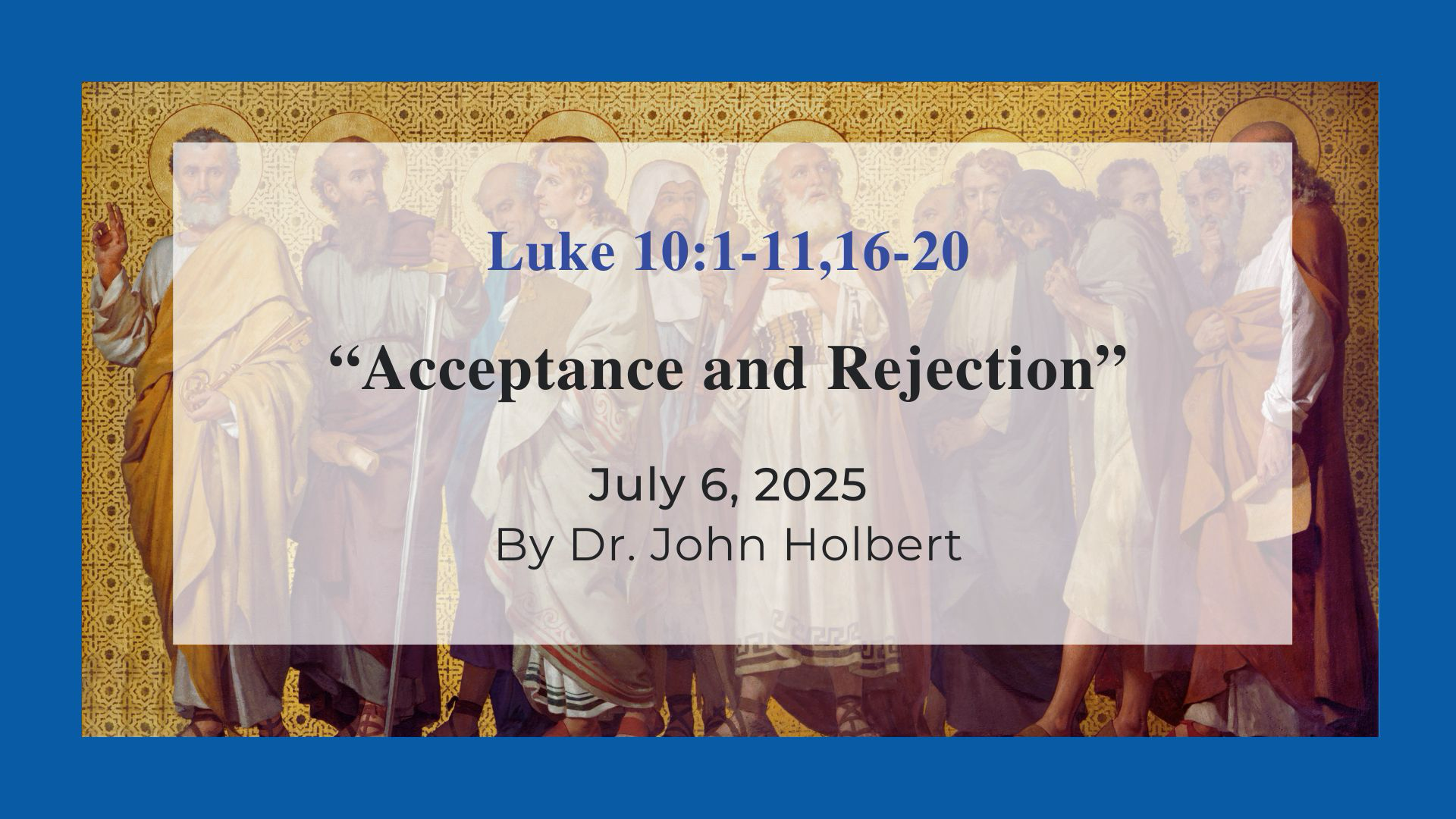Acceptance and Rejection - Reflections on Luke 10:1-11, 16-20, Pentecost 4, Year C
by John C. Holbert on Tuesday, May 13, 2025

Both Luke’s Gospel and his second volume, the Book of the Acts, focus considerable attention on the acceptance and rejection of the gospel of Jesus Messiah and his followers. Surely, actual historical reality lies behind this fact. What the rule of God, the realm of God, the kingdom of God, represents is something quite new and quite radical in the world of Rome. Indeed, the New Testament as a whole, albeit in multiple sorts of ways, provides an alternative reality to what many imagined to be the stable and unchanging power of Rome to determine just how lives in the empire were to be lived. And if any would dare to challenge this power, the result would surely be persecution and even death. The stories of Jesus, Paul, Peter, Stephen, and other early adherents of the Good News makes that plain enough. Each of the four mentioned ended their days as murder victims at the hands of Roman authority.
Thus, it was important for each Gospel writer to emphasize that to follow Jesus was to court danger that could well lead to death. In this chapter of Luke’s tale, it is not only the power of Rome that is to be feared, but also certain powers inimical to orthodox Judaism should be taken with seriousness and with extreme caution. Nevertheless, in no way were either Jesus or his early disciples to limit their preaching only to those anxious to listen. In Luke 10, the 70 chosen followers of Jesus are given strict instructions concerning just how they are to act and react among the Samaritans, among whom they are about to find themselves.
It is quite clear just how strange and dangerous these Samaritan Jews appeared to traditional Jews in first-century Palestine. They read the sacred text, all right, but that text had certain features that the orthodox Jews of the time found anathema. Judaism, for perhaps seven centuries, had demanded that the only place that the faithful could worship YHWH was Jerusalem, the city of David that had stood for over 1000 years, excluding the terrible interval of the Babylonian exile. To the contrary, the Samaritans, a “mongrel” race of Jews, the result of the mixing of the remnants of the conquering Assyrians of the 8th century BCE and the Jews living in the north of Israel at the time, stood over against the Jews of Jerusalem. They were called Samaritans precisely because they were convinced that the true place of worship was Samaria, the old capital of the kingdom of Israel, following the division of the nation in the 10th century BCE. Over the many centuries of their existence, great enmity had arisen between them and the traditional Jews who continued to maintain Jerusalem as the center of correct Judaism. Luke 9:53 makes it plain that his chosen 70 disciples were going to pass right through Samaria on their way to Jerusalem, though it was apparently common for Jews at the time to go around this unfriendly area.
The 70 are chosen no doubt as an echo of the 70 elders of Israel, chosen by Moses to share his work with the people (Num.11:16-17). These 70 also accompany Moses up the holy mountain before his confrontation with YHWH (Ex.24:1, 9-14). Luke is ever intent on picturing Jesus as a prophet like Moses. But here the followers are given explicit directions when they confront the dangerous Samaritans. “I am sending you like lambs among wolves,” he warns (Luke 10: 3). They are not to carry “purse or bag,” nor are they “to wear sandals” (Luke 10:4). They are “to greet no one on the road,” (Luke 10:4), perhaps an odd-sounding and overly negative request, until we remember how Jesus himself was treated when he entered a Samaritan village at Luke 9:53: he was not welcomed there because “he was on his way to Jerusalem,” a den of iniquity for many a Samaritan.
The 70 are further told to, upon entering a house, to say right away, “peace to this household,” hoping for a positive reply for peace, though obviously such a reply is not guaranteed, else Jesus would not have needed to make the request. They are to eat what is offered, and they are always to “heal the sick people,” and must say, “the kingdom of God has reached you” (Luke 10:8-9). Nevertheless, says Jesus, some will not welcome you, and when that occurs, you must “wipe off the dust that sticks to your feet from the city” (Luke 10:11). But even when that happens, you must never forget that “the kingdom of God has arrived!” (Luke 10:11).
Jesus goes on to proclaim that he “was watching Satan fall like a bolt of lightning from the sky” (Luke 10:18). This sentence has engendered the most fanciful nonsense from those willing to distort the text for their own purposes. Luke refers here to Is.14:15, a prophetic text used against the king of Babylon who represents for the prophet any earthly power that attempts to stand against the power of YHWH. Satan becomes for Luke such a power, as he will also become for the author of the Revelation of John. Those are poetic representations, not literal ones, despite those who would read them as such.
The upshot of this text is: the Gospel must be preached, whether it is accepted or rejected, because the fact remains that in the coming of Jesus we know that the kingdom of God has come! Many may reject it, as over the centuries they certainly have, but those of us who follow Jesus must announce without ceasing that God is ruler yet and always, not any so-called earthly or heavenly power that would claim otherwise.
